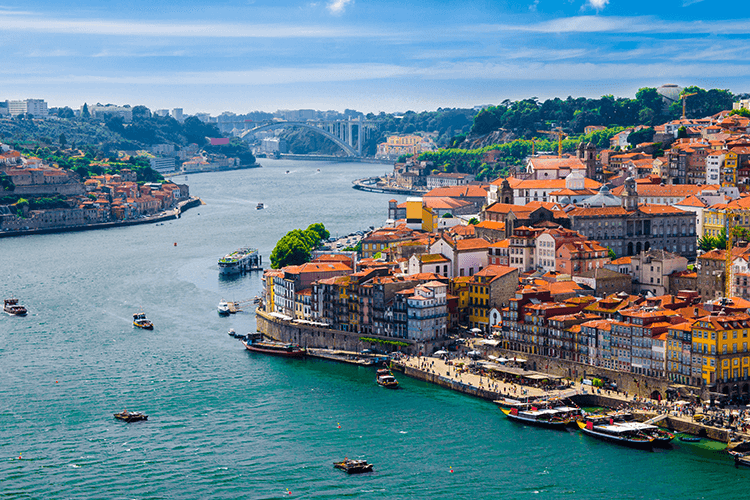Portugal’s location, climate and population
Portugal is one of the oldest countries in Europe, with its capital, Lisbon, located in the southwest of the Iberian Peninsula, bordered by Spain to the north and east, and the Atlantic Ocean to the south and west. The population of Portugal is approximately 10.33 million people.
Portugal enjoys a moderately mild climate, varying across regions as follows:
- South: Dry.
- Northwest: Rainy.
- Northeast: Long and warm summers.
In Lisbon, the average daytime temperature is +27.8 degrees Celsius, with areas closer to the sea being warmer in August and September. The average daily temperature in January in Lisbon is +14.7 degrees Celsius, and snowfall is rare.
Education quality in Portugal
Portugal boasts high-quality secondary and higher education, with most degrees from Portuguese universities recognized in the European Union. This facilitates graduates in finding employment in other EU countries.
University courses are taught in both Portuguese and English. The cost of a bachelor’s degree taught in English at the University of Porto is at least 8,900 euros annually, while the cost of a degree taught in Portuguese at the University of Coimbra is at least 6,340 euros annually.
Healthcare
Portugal allocates around 9% of its annual Gross Domestic Product to healthcare. According to the 2020 Global Health Expenditure study, the country ranks 36th in terms of healthcare spending. Medical care is available for free in public hospitals and is accessible to both citizens and residents of the country.
Lifestyle
Portugal is suitable for those who appreciate a relaxed pace of life and a tranquil living environment. The cities are less vibrant compared to urban areas in the United States or the United Kingdom.
The Global Peace Index for 2023 ranks Portugal seventh among the safest countries in the world, and in 2020, it ranked third in the Global Peace Index. Portugal has a low crime rate, and its people are friendly, welcoming, and open.
Residency Options in Portugal
Portugal stands out as one of the easiest countries to obtain residency, making it an excellent choice for individuals seeking residency that leads to citizenship.
This can be achieved through residency programs in Portugal, and at Reach we offer you more than one option, as follows:
This program provides an opportunity for those interested in obtaining Portuguese residency and enjoying various benefits by investing in investment funds with a minimum amount of 500,000 EUR.
The D8 Visa, also known as the Portugal Digital Nomad Visa, is intended for people from outside the European Union who work remotely and wish to move and settle in Portugal by providing a monthly income and the financial ability to cover their living expenses there.
The D7 Visa, also known as the Portugal Passive Income Visa, allows you to move to and live in Portugal by providing a regular income, such as a pension, rent, dividends, or certain types of investment income, provided that it is sufficient to cover your living expenses in Portugal and is at least equivalent to the country’s minimum wage.
Foreigners holding a residence permit in Portugal can benefit from the Non-Habitual Residency (NHR) program, which allows for a tax exemption on income earned abroad. The system also enables investors to reduce their income tax liability in Portugal.
The income tax rate for skilled professionals, such as executives, programmers, engineers, scientists, artists, and performers, is reduced to 20% on a gradual scale that reaches up to 48%.
Portuguese economy
The Portuguese economy has undergone several changes over the past few decades, gradually beginning in the 1970s, when it started to lift restrictions and open up its economy. During the 1990s, Portugal adopted an economic policy guided by the convergence criteria of the European Monetary Union (EMU).
Portugal has joined the European Union since its establishment in January 1999, and this required meeting a set of quantitative criteria aimed at ensuring credibility in the field of macroeconomics. Today, Portugal is among the world’s 50 largest economies.
Cost of living
The basic cost of living in Portugal is approximately 37% lower than in the United States, and prices are also lower than in other European countries such as Austria, Switzerland, the United Kingdom, and Spain. When comparing the cost of living in Portugal with other European Union countries, life is relatively inexpensive.
English language
Since most Portuguese people speak English, proficiency in the Portuguese language is not a necessity. According to the latest EF Global English Proficiency Index, Portugal ranks eighth out of 111 countries due to its high proficiency in the English language. Areas with the highest scores include Leiria, Braga, Viseu, Porto, and Aveiro.
If you are interested in obtaining permanent residency in Portugal through investment, contact us to schedule a free consultation by clicking on the link here.










